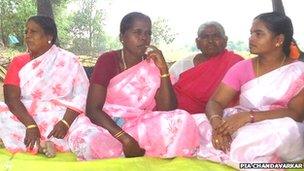Is Indian storytelling a dying art?
- Published

The traditional Indian custom of passing down epics and village folklore from one generation to the next through storytelling is slowly dying with increasing globalisation and the all-pervasive media. Pia Chandavarkar reports from Thanjavur in the southern state of Tamil Nadu.
On a sunny morning in the sleepy village of Panayakottai, near the town of Thanjavur, a group of housewives get together under the shade of a banyan tree.
Dressed in their finest saris, the women take turns sharing folk tales from their village, breaking into song during parts of the story.
A group of folklore experts and storytellers from the city of Chennai listen to them intently.
They have come to study this style of narration - known as Kathaiyum Paattum or, storytelling with song.
The women are rather bewildered at the attention their stories are receiving.
"Hardly anyone tells these stories anymore. And very few are interested to hear them. In fact, we have to dig through our memory, because it's been so long since we narrated them," says 51-year-old Elanjiam, who uses only one name.
Storytelling has been an integral part of Indian culture for generations, with each region developing its own unique style of narration.
Unlike other well documented forms of storytelling through song in Tamil Nadu - like the Katha Kalakshepam from Thanjavur - Kathaiyum Paattum is a more informal art performed, as experts say, "under the radar".
"These kinds of stories were traditionally shared amongst villagers to narrate events or experiences, or to teach certain morals to children at home," says Eric Miller, a folklore expert in Chennai, who led the group to Panayakottai.
'Silly, boring'
Bhanumathi, 35, fondly remembers the bedtime stories her father told her when she was a child. They were mostly religious stories or local village legends.
"Those stories and songs I learned as a child stayed with me, and when I grew older, I sang them when I went to work in the fields. Even today I share them with my friends to pass the time," she says.
But she never tells these stories at home, because she feels it is a "waste".
"My children just ridicule them, saying they're silly, boring stories from a bygone era. They prefer to watch television instead. So I'd rather keep these stories to myself," she says.
With satellite TV finding its way to even the most remote villages in India, television channels are replacing traditional forms of entertainment.
"Children in villages now watch cartoons and TV shows from all over the world. So, instead of learning about their own cultural identity, they live in a utopian world of stories from far-away lands," says folklore scholar Aru Ramanathan.
In cities, where children also have access to other forms of entertainment like the internet, mobile phones and other gadgets, storytelling has become even more challenging.
'More relevant'
But, Mr Miller feels that traditional forms of storytelling are now more relevant and significant than ever.
"Many children in cities today are being diagnosed with attention deficit disorder. Storytelling can help develop their abilities to sit down and listen, specially if it is told in an interesting manner like interspersing with songs," he says.
With increasing urbanisation and disintegration of the joint family system, children are also spending less time with grandparents and extended families.
In Panayakottai, 52-year-old Dnyanasundari says she rarely gets to spend time with her grandson who lives in the nearby town of Thanjavur with his parents.
"I keep telling my daughter to keep up the tradition of storytelling. Children will be interested if you make the effort. We have to sit down with them and tell the story in a way they will find exciting."
Dnyanasundari says she has written down all the stories and songs she knows, so they will be easily available for her daughter and sons.
"My daughter says she doesn't have the time, but I am sure she will do it after I'm gone," she says.
While others may not be as optimistic, experts are now exploring ways in which storytelling can be adapted to the changing times.